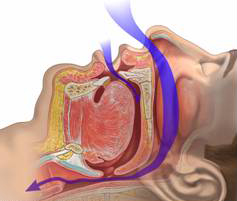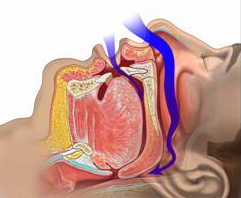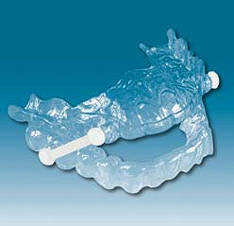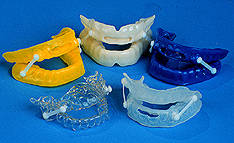|
|
|
|
|
| |
Quality general dental care with an emphasis on natural esthetics, form and function. Experience with complex restorative, prosthetic and implant treatment.
----------------------------------------------------------------------------------------
SNORING AND SLEEP APNEA

It is estimated that more than 80 million people in North America snore while sleeping. National Institutes of Health (NIH) found that 30% of the population under 40 years of age snores, while 50% over the age of 60 does. Spouses and children are often repeatedly disturbed during their sleep cycles by a snoring family member, which can lead to tensions and animosity.
Sleep apnea and snoring can be frustrating for patients and their loved ones. Lack of sleep and the associated physical affects can be life altering or life ending. Recent studies have linked a high percent of patients with sleep apnea and snoring with an increase in arteriosclerosis of the carotid arteries of the neck. This can lead to an increased risk of cardiovascular problems such as heart attack or stroke. Snoring can kill you, according to a UCLA School of Dentistry study: the struggle for breath can result in soaring blood pressure which can damage the walls of the carotid arteries and increase the risk of stroke.
Snoring and sleep apnea can also worsen serious health problems including hypertension, leading to stroke, heart attacks, heart failure and puts the patient at an increased risk for sudden death. The National Council on Sleep Disorders attributes 38,000 cardiovascular deaths per year to consequences of sleep apnea.
Do all people who snore have sleep apnea?
Not all people who snore have sleep apnea, but all patients with sleep apnea snore. The only way to determine if you have is sleep apnea is to be tested by a doctor trained in sleep medicine and have a study done at a sleep center.
Most medical insurance plans will cover a sleep study and this should be considered to avoid the possible medical consequences as previously discussed for sleep apnea.
What causes snoring?
During sleep, the muscles and soft tissue in the throat and mouth relax making the breathing airway smaller. This decrease in the airway space increases the velocity of air flowing through the airway during breathing. As the velocity of required air increased in the constricted space, soft tissue like the soft palate and uvula vibrate. These vibrations of the soft tissues in the mouth and throat result in what is called "noisy breathing" or generally referred to as snoring. It has also been shown in sleep studies that excess body weight especially in the throat area, heavy alcohol consumption and other sedatives increase the severity of snoring.

Normal airway with no obstruction in the upper airway. No or very infrequent sounds during sleeping are heard

Partial obstruction of the upper airway called Hypopnea. There is a partial narrowing of the pharyngeal airway. Snoring results from the vibration of tissues in the airway to include uvula, soft palate, obstructive tonsils, deviated septum, hypertrophied nasal turbinate and mandibular or bimaxillary retrognathism are amongst various factors causing snoring and obstructed sleep apnea. A dental appliance can help alleviate this snoring by positioning the mandible and tongue in a more anterior position, opening the airway.

During obstructive sleep apnea, the flow of air is blocked through the upper airways and patient is deprived of receiving vital oxygen deemed necessary for normal body function. These patients may stop breathing several times a minute and great strain is placed on the heart during sleep.
What are the symptoms Snoring and Sleep Apnea?
- Waking up after a full night in bed and feeling tired
- Waking with a headache
- Feeling sleepy during the day
- Falling asleep during the day
- Unable to concentrate during the day
- Waking during the night with a feeling of gasping for air
- Decrease in psychomotor behavior such as sexual activity
How can I prevent snoring?
Snoring is involuntary but changes in your lifestyle can alleviate occasional snoring.
Daily exercise and weight loss will improve muscle tone and increase the airway space.
- Avoiding sedatives and antihistamines
- Avoiding alcohol and heavy meals 3-4 hours before bedtime
- Sleeping with a pillow that supports the neck and does not cause the head to held at a sharp angle
- Keeping the air moist in your bedroom, as dry air causes the membranes to more readily collapse. An electric humidifier or a pan of water in the room near the heating source will help moisten the air during the colder months when indoor air tends to be dry. Also the use of saline nasal spray before bed will keep the membranes moist in the nasal passage. Saline is salt water equal to the bodies salinity and can be used as often as needed with no negative consequences as seen with nasal decongestant sprays which have chemicals in them.
What can be done to treat snoring and sleep apnea?
Surgical techniques to remove respiration impairing structures such as uvula, enlarged tonsils and adenoids have been among the many attempted snoring remedies. These soft tissue surgical procedures have shown only moderate success rates (e.g. 20 - 40%). At certain levels of severity, complete blockage of the airway space by soft tissues and the tongue can occur. If this period of asphyxiation lasts longer than 10 seconds, this is called Obstructive Sleep Apnea (OSA). OSA can be a serious medical condition. OSA can only be diagnosed by an ENT in a sleep center where you are monitored during sleep to check for periods of asphyxiation.
The majority of snorers can be treated with dentist prescribed oral snoring appliances such as the Silent Nite. This also serves as a wonderful adjunct in those patients who do require surgery to treat their OSA and snoring, increasing success to 85 - 90% in those patients.
Depending on the severity of your snoring and sleep apnea several approaches can be used. Often they are used in combination to eliminate the problem.
Oral appliances such as the Silent Nite, can be used either alone or following surgery to help increase the airway space.
Continuous positive airway pressure(C-pap) involves the use of a mask worn over the nose during sleep that blows air into your throat to maintain an open airway decreasing airway collapse.

Surgical approaches include; trimming of the soft palate and uvula with a laser called laser assisted uvuloplasty (LAUP). Radio-frequency devices have been used to shrink tissues in the throat and nose. Correction of deviated septum and trimming of the bony turbinates of the nose has been used to increase nasal airflow.
How does the Silent Nite prevent snoring?
Snoring research has shown that custom fabricated dental appliances worn at night that move the lower jaw into a forward position, increase the three dimensional space in the airway tube which reduces air velocity and soft tissue vibration. By increasing the volumetric capacity of the airway and preventing soft tissue vibrations, snoring is eliminated. In clinical research studies, these dentist fabricated oral appliances have exhibited initial snoring prevention success rates of between 70 to 100%.
The Silent Nite appliance positions the lower jaw into a forward position by means of special connectors that are attached to the upper and lower forms. These forms are custom laminated with heat and pressure to the dentist’s model of your mouths providing an excellent and comfortable fit with minimal size to the appliance.

Breathing is EASIER with the Silent Nite appliance
The Silent Nite does not interfere with breathing through the mouth. Even when nasal passages are congested the device prevents snoring and allows uninhibited oral breathing. The connectors allow the patient to move the jaw side to side and open and close the mouth minimizing potential stiffness in the joints of the jaw in the morning. Silent Nite appliances help promote deeper, more restful sleep by preventing snoring. You wake feeling better rested and more energetic.

How can I determine if snoring appliance will benefit me?
A simple test is to put your teeth together, close your lips and inhale through your nose. You should then open your mouth and move your lower teeth slightly in front of your upper teeth (a bull dog like bite) and close your lips. When inhaling through your nose you should notice improved airflow and less snoring noise. If the result to this test is positive (less noise and better breathing) then the SilentNite appliance will benefit you. This therapy has been shown in studies to help 85% of patients that snore or have sleep apnea. The remaining 15% require other therapeutic approaches (i.e. surgical) to correct the problem.
Implant Cosmetic Dental Center™
----------------------------------------------------------------------------------------
Dr. Gregori M. Kurtzman is an international lecturer, selected as one of the top 100 dental speakers since 2006 by Dentistry Today, author of over 200 professional articles, a consultant to multiple dental manufacturers for product evaluation, development and research, he provides general dental care in suburban Maryland since 1986.
|
|
|
|
|
|
|
|
|